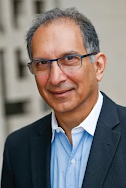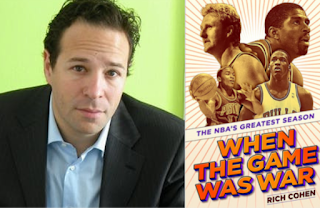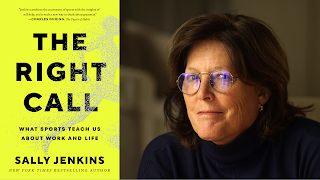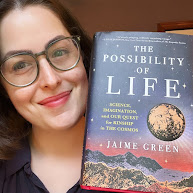Jeff Schechtman's "Talk Cocktail"
"To discover to the world something which deeply concerns it, and of which it was previously ignorant; to prove to it that it had been mistaken on some vital point of temporal or spiritual interest, is as important a service as a human being can render to his fellow creatures..." John Stuart Mill, "On Liberty"
Wednesday, December 27, 2023
Daniel Sokatch: A Pivotal Figure in Modern Jewish Dialogue and Israeli Affair is Redefining Jewish Advocacy
Monday, December 11, 2023
Unmasking the Elepahant
Monday, December 4, 2023
Jonathan Taplin vs. the tech billionaires
 Jonathan Taplin, a film producer, scholar, and director emeritus of the Annenberg Innovation Lab, is a vocal critic of excessive techno-optimism. In his book, "The End of Reality: How Four Billionaires are Selling a Fantasy Future of the Metaverse, Mars, and Crypto," he argues that the California-centric billionaires Peter Thiel, Elon Musk, Mark Zuckerberg, and Marc Andreessen are diverting public attention from critical issues. He criticizes the media's role in glorifying them and advocates for a cultural shift that emphasizes real solutions over escapist narratives.
Jonathan Taplin, a film producer, scholar, and director emeritus of the Annenberg Innovation Lab, is a vocal critic of excessive techno-optimism. In his book, "The End of Reality: How Four Billionaires are Selling a Fantasy Future of the Metaverse, Mars, and Crypto," he argues that the California-centric billionaires Peter Thiel, Elon Musk, Mark Zuckerberg, and Marc Andreessen are diverting public attention from critical issues. He criticizes the media's role in glorifying them and advocates for a cultural shift that emphasizes real solutions over escapist narratives.My California Sun podcast with Jonathan Taplan:
Tuesday, November 28, 2023
From Poverty to Empowerment: The Rise of the Global Middle Class
 The middle class stands as the most successful demographic in world history. By the time we reach 2030, it's projected that the fifth billionth person will have joined its ranks. This journey, which began just over two centuries ago by people in pursuit of a better life, has sparked an unparalleled global transformation.
The middle class stands as the most successful demographic in world history. By the time we reach 2030, it's projected that the fifth billionth person will have joined its ranks. This journey, which began just over two centuries ago by people in pursuit of a better life, has sparked an unparalleled global transformation.In today's landscape, where half of the global population finds themselves at or above the middle-class threshold, the work of my guest
Monday, November 27, 2023
Robert Sapolsky and Our Illusion of Free Will
My California Sun conversation with Robert Sapolsky:
To access my conversation with Robert Sapolsky, please go to our new Substack page By doing so, and signing up, you'll receive them directly in your email and ensure that you don't miss anything during our transition to Substack.
Tuesday, November 21, 2023
Don’t Shoot the Messenger: The Methods and Power of Pollsters

In this WhoWhatWhy podcast I talk with Scott Keeter, the senior survey adviser at Pew Research Center. In this role, he guides all of Pew’s research and polling. An expert on American public opinion and political behavior, he is a co-author of four books on the subject.
Keeter discusses the complexities of modern polling amid a climate of skepticism and change. As the 2024 elections approach, Keeter confronts the polling industry’s pressing issues: dwindling response rates and the public’s eroding trust in institutions.
My conversation with Scott Keeter:
To access my conversation with Scott Keeter, please go to our new Substack page By doing so, and signing up, you'll receive them directly in your email and ensure that you don't miss anything during our transition to Substack.
Wednesday, November 15, 2023
A Conversation with Heather Cox Richardson
In an era marked by relentless political turmoil, authoritarian threats, and pervasive societal corruption, Richardson's work serves as a crucial reminder: these challenges are not sudden anomalies but the culmination of a long, complex history.
Through her latest book, 'Democracy Awakening,' Richardson provides more than a mere chronicle of events. She offers a critical narrative that links our past to the present, shedding light on how America, once a beacon of democracy, now hovers dangerously close to autocracy. Her analysis is not just about understanding our history; it's about charting a course back to democratic principles.
Monday, November 6, 2023
From Buy to Cell: The Journey of SBF
Faux, a Bloomberg investigative reporter who has covered SBF and the crypto craze since the beginning, spent time with SBF in the Bahamas and sat in the courtroom every day of the trial. Faux’s investigation into the $3 trillion crypto delusion offers a sobering look at our financial epoch which is defined by SBF’s rise and fall.
Monday, October 30, 2023
 On this week’s WhoWhatWhy podcast, I explore the intricate landscape of global terrorism, the Israeli-Palestinian conflict, and the geopolitical reverberations of recent events.
On this week’s WhoWhatWhy podcast, I explore the intricate landscape of global terrorism, the Israeli-Palestinian conflict, and the geopolitical reverberations of recent events.My guest is Kenneth Katzman, a senior adviser with The Soufan Group and a preeminent expert on the Middle East. Specializing in Iran, the Persian Gulf states, Iraq, and Afghanistan, Katzman has previously served as a senior analyst at the Congressional Research Service and an analyst at the CIA.
My conversation with Kenneth Katzman:
To access my conversation with Ken Katzman, please go to our new Substack page By doing so, and signing up, you'll receive them directly in your email and ensure that you don't miss anything during our transition to Substack.
Monday, October 23, 2023
Navigating the New Geopolitics: A Conversation with Sam Ramani
Ramani describes our global politics as increasingly volatile due to the erosion of international law and the rise of a multipolar world. He views Russia's invasion of Ukraine not merely as a breach of sovereignty but as a symptom of a larger, systemic decay in international norms.
Tuesday, October 17, 2023
Carl Safina on Nature, Philosophy, and Unexpected Teachers
My conversation with Carl Safina:
Sunday, October 15, 2023
Can America Survive Its Own Constitution? The Tyranny of the Minority
Ziblatt argues that the nation’s precarious condition is defined by two contrasting views of what George Washington called “the last great experiment for promoting human happiness”: one that aspires toward a multiracial, multicultural democracy focused on equity and inclusion, and another that leans toward authoritarianism — a dichotomy Ziblatt says is epitomized by the events of January 5 and 6.
Saturday, October 7, 2023
The Invisible Frontlines: Israel’s Secret War Against a Nuclear Iran
October 6, 2023 — While Iran may not be dominating today’s headlines, its nuclear ambitions are as fervent as ever. Equally unyielding is Israel’s determination — covert or otherwise — to thwart these ambitions.
On this week’s exclusive WhoWhatWhy podcast, Yonah Jeremy Bob, a senior analyst for the Jerusalem Post and former high-ranking Israeli official, pulls back the curtain on Israel’s covert operations against Iran.
Bob’s latest book, Target Tehran, offers a rare glimpse into Israel’s multilayered strategy to counter Iran through sabotage, cyberwarfare, assassination, and secret diplomacy.
My WhoWhatWhy conversation with Yonah Jeremy Bob:
Monday, September 18, 2023
When the Game Was War: The 1987-88 NBA Season: A Conversation with Rich Cohn
Teams and athletes often define more than games; they encapsulate eras and collective memories. While some teams symbolize a specific year, like the 1998 Yankees, others represent an entire era, such as the Celtics from 1960 to 1966. Rarely, individual athletes like Tiger Woods in 2000 become the face of a time period. Even rarer is a year that defines an entire league, and for the modern NBA, that was the 1987-1988 season. It was a pinnacle year featuring iconic battles and drama with legends like Magic Johnson and Michael Jordan. Today, we're joined by Rich Cohen, a New York Times bestselling author and columnist, to discuss his latest book, "When the Game was War," which delves into this unforgettable NBA season.
My conversation with Rich Cohn:
To access my conversation with John Coates, please go to our new Substack page By doing so, you'll receive them directly in your email and ensure that you don't miss anything during our transition to Substack.
Tuesday, September 5, 2023
Power Play: How Just 12 People Control America’s Economic Destiny: A conversation with John Coates
Saturday, August 26, 2023
Living History: A Conversation with Drew Gilpin Faust on the Pivotal Moments That Shaped Her and All of Us
Wednesday, July 26, 2023
Can Boomers Ever Age Out Gracefully? A Conversation with Dr. Rosanne Leipzig
My conversation with Dr. Rosanne Leipzig:
What Sports Teach Us About Work and Life: A Conversation with Sally Jenkins
Undeniably, these individuals bring innate talents to their respective sports. However, these talents alone are insufficient. Their success hinges on what they do with their abilities—the discipline, practice, conditioning, resilience, and dedication to their sport.
The question we face today is what we can learn from their success. In all aspects of our lives, some, if not all, of the skills exhibited by these athletes are crucial. How we utilize our talents, how we 'come to play' every day, as the saying goes, can make the difference between success and failure in life.
The narratives we construct internally are what distinguish greatness from mediocrity.
These are some of the topics discussed by the great Sally Jenkins, in this podcast and in her new book, "THE RIGHT CALL
What We Imagine "Out There" Reflects How We See Each Other
Science fiction has certainly presented us with a myriad of interpretations of what might exist beyond our planet. However, the individual manner in which we conceptualize the possibility of extraterrestrial life becomes a sort of Rorschach test—reflecting our worldviews, our notions of life, and our innate longing to connect with something larger than ourselves, even on an intergalactic level.
This flight of imagination is a significant element of what my guest, Jamie Green, discusses in her book, The Possibility of Life. In it, she delves into our evolving understanding of the cosmos and underscores our need to pose an even deeper question: What does it mean to be human?














